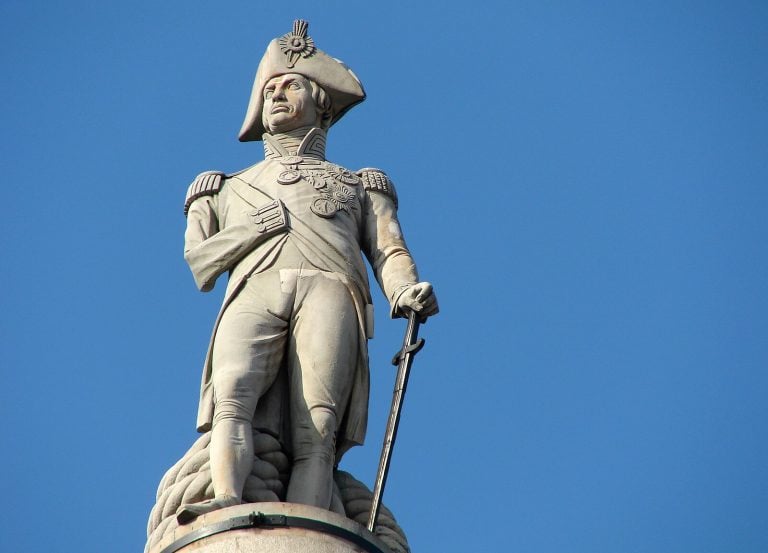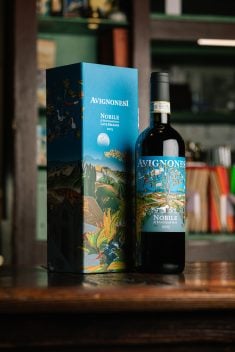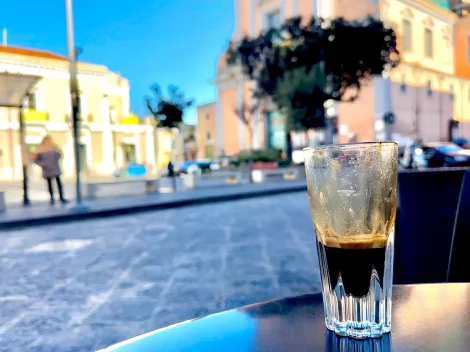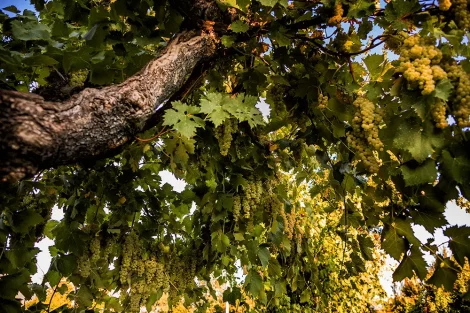Marsala is an Anglo-Sicilian wine. Although the history of viticulture in Western Sicily stretches back to the times of the Greeks and Carthaginians, and there are claims that the precursor to the fortified wines were 'alto grado', or high alcohol wines made from varieties such as Grillo, Marsala as we know it today is a British invention.
As the famous story goes, British merchant John Woodhouse arrived in the port of Marsala in 1773 and found the local wines to be to his taste. He decided to add more alcohol in order to help preserve the wine for its sea voyage, sent some barrels back to Britain, and they proved to be a hit.
Other Englishmen soon followed.
“The British were the ones to commercialise Marsala and turn it into a consistent product that could be sold across the world. They turned it into an industry, they were much more entrepreneurial – it’s an Anglo-Sicilian wine," explains Henry Jeffreys, a wine journalist, podcaster and author of books including Vines in a Cold Climate and Empire of Booze.
The origins of this drink have certain connections with those of another beverage in the category, as Demetri Walters MW, a wine educator, speaker and fortified wine expert, reveals: "Madeira and Marsala have a related history. The former developed because of the oxidation and heating of the wines that took place in the orlop deck of many ships, both Royal Navy and merchant fleet, and people liked the style, so they started to deliberately ‘cook’ the wines in the destination markets. Marsala didn’t go through that process per se, but they would add heated must, 'mosto cotto', to the base wine."
The Marsala industry had a major advantage over that of Madeira – space to grow, as Jeffreys says: "Madeira was massively popular but could only produced in a limited quantity due to the size of the island, whereas Marsala production could be massively expanded."
Never mind manoeuvres, always go straight at 'em
Geopolitics soon provided a major commercial opportunity for the fledgling Marsala industry – war with France meant that Britain's Royal Navy had to be adequately armed and, of course, provisioned.
“The Royal Navy was probably the biggest customer for drink in the world – everyone associates them with rum, but they would have also had lots of beer, lots and lots of wine of all sorts, and Marsala was the perfect ship’s wine because it was very stable: it had been sitting there, gently oxidising for many years. Like Madeira, it was unbreakable," says Jeffreys.
Fortification was a necessity for wine that was to be stored in the bowels of ships during long sea voyages, as Walters shares: "Fine bottles of Bordeaux and Burgundy would have been completely knackered after a couple of months in the rather warm, humid orlop deck."
This onboard resilience made Marsala particularly appealing to the man who is still considered to be one of history's greatest ever naval commanders – Horatio Nelson.
While operating in the Mediterranean towards the end of the 18th century, Nelson would meet two important figures. The first was Lady Emma Hamilton, wife of the British envoy to the Kingdom of Naples and his future mistress, and John Woodhouse Junior, son of the Liverpool merchant who had kickstarted the Marsala industry two decades prior. It seems that after their first meeting in 1798, Nelson and Woodhouse regularly corresponded, and Nelson placed an order for 200 pipes (approximately 110,000 litres) of Marsala to provision his ships with.
"The wine is so good that any gentleman's table might receive it, and it will be of real use for our seaman," he wrote to his superior officer, Lord Keith.
As a result of his service to the kingdoms of Naples and Sicily, including the highly controversial execution of Neapolitan revolutionaries, Nelson was made Duke of Bronte in 1799. Despite Bronte being on the other side of Sicily to Marsala, Nelson's dukedom prompted Woodhouse Junior to set aside one particularly good cask of Marsala and name it 'Bronte Marsala' in his honour.
Given the dozens of stylistic classifications available for Marsala wines today, it isn't entirely clear which style Nelson had tasted and purchased. Walters explains: "It would have been a mixture of styles, because Marsala was still new by that point – it was very different to what exists now.”
A further factor which made Marsala a good wine for the Royal Navy was that Sicily never fell to Napoleon, meaning that the supply wasn't interrupted as the city remained a friendly port.
Subject to the requirements of the service
As Nelson's letter to Lord Keith indicates, alcohol was as integral to the Royal Navy during the Revolutionary and Napoleonic Wars as cannon balls or rope.
"People drank a lot in those days and they didn’t think it was a problem – it was probably handy that they were a little bit sozzled when they had to go into battle," says Jeffreys. "Think about Patrick O’Brian’s Aubrey-Maturin novels, they’re just soaked in alcohol! Half the books are about provisioning the ships."
And it wasn't just officers dining in Nelson's cabin on HMS Victory, for example, who were kept topped up – drink was part of the ration for ordinary sailors too. For many of the men crewing these ships, the quality of life was noticeably better on board than it was on land.
"They got more calories on a Royal Navy ship – they were fed twice a day and given lots of drinks. You might lose an arm, but at least you’re getting plenty to eat," remarks Jeffreys.
Walters argues that this diet, and especially the alcohol in it, meant that health was maintained as well as morale: "The combinations of spirits, fortified wine and lemon juice made the Royal Navy a lot fitter and healthier during the Napoleonic Wars, which enabled them to police the Mediterranean."
It also, perhaps surprisingly, helped to keep the sailors disciplined, Walters adds: "Giving people a ration of wine also means that illicit drinking is less likely."
One factor which sparked the infamous 1789 mutiny of the crew of HMS Bounty was the stopping of the rum ration as punishment for a suspected theft – a daily dose of alcohol helped to keep the peace a long way from home.
'Thank God I have done my duty'
Although it would be going too far to suggest that the drinking habits of Royal Navy sailors is what truly won the Battle of Trafalgar on 21 October 1805, alcohol was to play a key role in its immediate aftermath.
Fatally wounded by a French musket ball earlier in the battle, Nelson passed away in the afternoon, shortly after his victory had been confirmed. He requested that his body not be thrown overboard, and so it was placed inside a leaguer, or large barrel, which was then filled with brandy (not rum, nor indeed Marsala) so that it would be preserved for the journey back to Britain, where the late admiral, the victor of the Nile, Copenhagen and Trafalgar, was given a funeral procession along the Thames before the body was then buried in St Paul's Cathedral. Although a popular legend states that sailors drank the brandy that had been used to store their commander as a mark of respect, this is likely untrue.
The immortal memory of Admiral Lord Nelson
However, despite Marsala playing its part in the provisioning of Nelson's navy, this drink's place in the annual commemorations of the Battle of Trafalgar has been usurped by other fortified wines.
The traditional tipple for toasting today is Port – according to Chatham Dockyards, once the powerhouse of Royal Naval vessel production, the first toast is to the reigning monarch and the second to the "immortal memory of Admiral Lord Nelson".
Indeed, Marsala hasn't been a fixture of the Trafalgar Day table for some decades. Copies of a 1958 Trafalgar Night Dinner menu, now in the possession of the National Museum of the Royal Navy, reveal that the evening started with La Ina Sherry and concluded with 1942 Vintage Port from Sandeman and Bristol Cream (a sweet blend of Sherries that is still consumed in the UK). Given the nation the battle was fought against, the inclusion of a 1945 Château Léoville-Poyferré seems somewhat perplexing.
To some extent this is an indication of the decline of the Marsala industry as a whole. Phylloxera, financial crises, world wars and, of course, the increasing sobriety of the Royal Navy all contributed to the diminishment of what was once a vast wine production operation down to what might be diplomatically termed as a more 'boutique' business.
But it might be the case that Marsala, a category that is experiencing a small but notable resurgence in the 21st century, will once again become a fixture of Trafalgar Night Dinners.
A spokesperson for the 1805 Club, which takes its name from the year of this most famous of British naval victories, expressed a desire to serve this fortified Sicilian wine at dinners in the future, alongside its HMS Nelson LBV Port. Given that Nelson and Trafalgar still figure large in British culture, helped by the grandeur of his Central London monument, perhaps the return of the wine most closely associated with him to the "gentleman's table" is long overdue.


 Meet the farmer pioneering English olive oil
Meet the farmer pioneering English olive oil 'You cannot ignore a country of more than 230 million people'
'You cannot ignore a country of more than 230 million people' 'I drink wine with Sprite,' confesses Lionel Messi
'I drink wine with Sprite,' confesses Lionel Messi The Consorzio Vino Chianti heads to Nigeria: 'A historic step towards opening new routes for Italian wine'
The Consorzio Vino Chianti heads to Nigeria: 'A historic step towards opening new routes for Italian wine' 'The Mercosur agreement is also good for Prosecco'
'The Mercosur agreement is also good for Prosecco'





